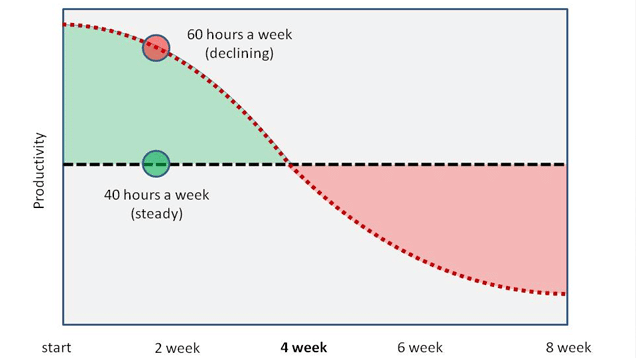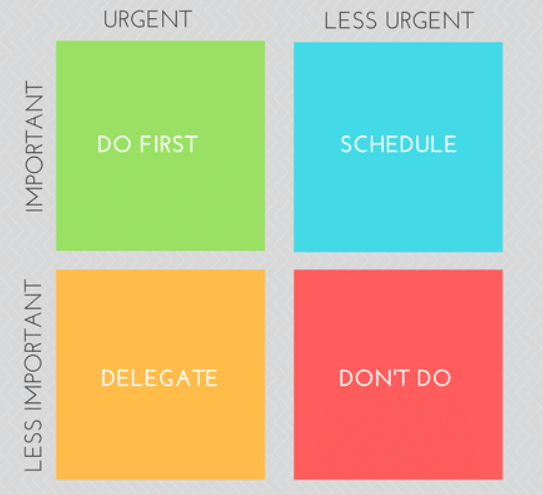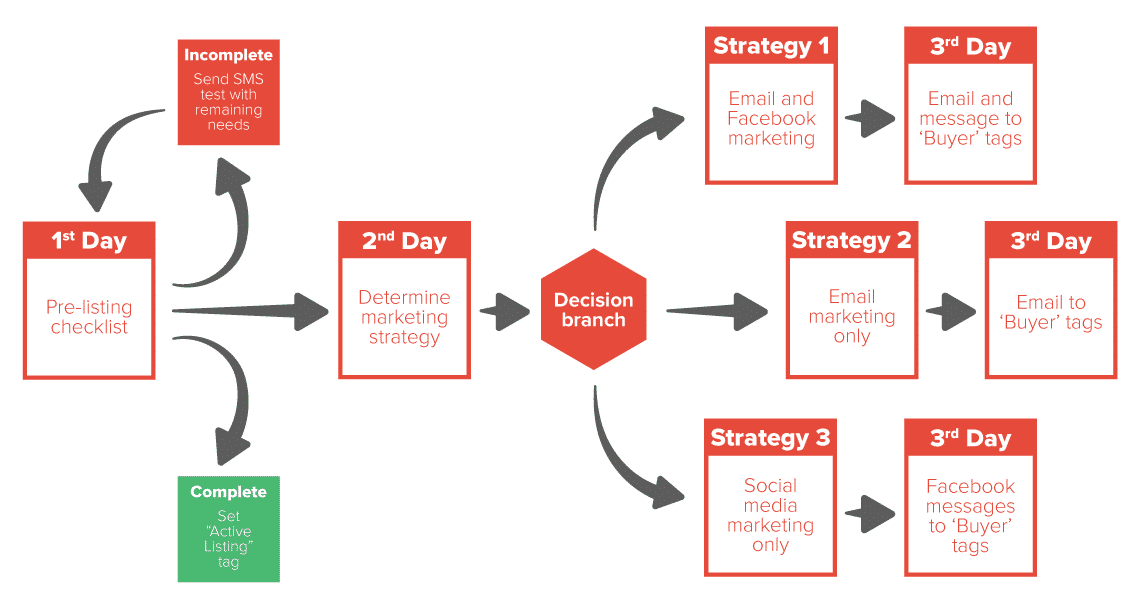For New Yorkers, complaining seems almost like a full-time job.
When I worked as an agent in Manhattan, the only people who complained about working “80-hour weeks” weren’t closing very many deals …
There’s a simple reason why:
The more stressed you are, the harder it is to sell real estate. 😨
Yes, really. You want to know what stresses most people out more than anything else? Working more than 40 hours per week.
Studies have shown that working more than 40 hours a week makes you LESS productive.
Thankfully, there’s a better way;
How to Learn to Stop Worrying & Love the 40-Hour Workweek
OK, I know what you’re thinking. You have to work 70 hour weeks to get ahead, right?
Believe it or not, there are 150 years of productivity research behind the 40-hour workweek.
More to the point, it wasn’t designed to help workers, but to boost productivity, and it applies to people working from home too.
In fact, study after study has shown that productivity falls off dramatically after working more than 40 hours per week for a month.
If you or a coworker needs a reminder to take a break, print out this graph from Daniel Cook and pin it to their monitor:

Long story short?
You CAN work 60 hours a week, but after an initial boost, your productivity falls off a cliff.
The takeaway here should be obvious …
OK, OK. I know what you’re thinking.
“I have too much to do and not enough time to do it as it is. How can I get MORE done by working fewer hours?!” 😡
Well, you’re going to have to embrace yet another cliche that turns out to be true:
Work smarter, not harder.
Ready to give it a shot?
Here are seven ways to become a lean, mean, selling machine that still has time to take the dog for epic walks or spend a week (or two) at the beach every year.
1. Master Your Morning Routine

Remember those stressed-out, low-producing agents in Manhattan I was telling you about? Most started their mornings by obsessively checking emails in bed and then rushing to the office with a bagel in their mouths. Then they would actually brag about only getting four hours of sleep the night before.
Of course, top-producing agents know that how you start your day is almost as important as what you do during the day. That’s why we recently interviewed high-performing agents from Douglas Elliman, Compass, and Warburg to get a sneak peek into their morning routines. As you can imagine, checking emails in bed and rushing to the office were not popular answers.
Here are four science-backed tips for your morning routine so you can start your day working smarter and not harder.
Wake Up at the Same Time Every Morning
A study from Harvard College showed that medical students who had irregular sleep patterns had lower GPAs than students with regular sleep patterns. While you might love the freedom to
“sleep in” that being a real estate agent gives you, waking up at the same time every day of the week will help make you more alert, more productive, and make it far easier to manage your time effectively.
Don’t Touch Your Phone
Studies show that cortisol levels (a stress hormone) are highest first thing in the morning. Throwing more stress into the mix by checking your phone as soon as you wake up will sap your energy before you even start your day.
Get Moving
A recent study in the British Journal of Sports Medicine found that exercising in the morning improved attention, visual learning, and decision-making throughout the day. So get moving in the morning to help get your deals moving in the afternoon.
Drink Coffee Like a Neuroscientist
Caffeine is a drug. Like any drug, dosage and timing are crucial to getting the best results. That’s why neuroscientists say that drinking coffee first thing in the morning, when cortisol stress hormones are highest, can hurt performance during the day. Instead, drink coffee between 9:30 and 11:30 a.m. to maximize the boost in alertness it gives you.
2. Use Time Blocking for Each Week & Set Goals Every Morning

Many agents make the mistake of micromanaging their schedules day-to-day. While many argue that “no two days are the same,” that’s simply not true for 99% of agents. If you pull back and look at the bigger picture, your goals for your weeks, months, and years are all aligned. Wasting time creating a new plan each day is not only exhausting, it can lead to you focusing on whatever happens to be worrying you that day instead of your long-term goals. It’s easy to veer off track.
Instead, real estate coach, top-producing agent, author, and speaker Sean Moudry recommends time blocking your week instead of your days.
Here’s what his typical week looks like:
Monday: Meetings, contracts, paperwork
Tuesdays: Lead follow-up and second showings
Wednesdays: Time off and appointments
Thursdays: Lead generation and appointment setting
Fridays: Lead generation and appointment setting
By planning out his week instead of micromanaging his days, Sean can more easily set achievable goals each morning by asking himself a simple question:
“If I could only accomplish two things today that would make me feel proud, what would they be?”
3. Prioritize Your Daily Tasks With the Eisenhower Matrix
Once you time block your week, you can prioritize tasks within your day. After all, every agent has fires to put out, and surprises are the norm for many agents.
The trick is to decide early on which tasks should be prioritized. This allows you to tackle your most urgent tasks when your energy levels are highest, and save the rest for when your energy is sapped later in the day.
Fifteen-year real estate veteran Joshua Jarvis uses what’s called the Eisenhower Matrix to help agents prioritize their daily tasks:

Like most great ideas, using the Eisenhower Matrix is actually pretty simple. Make a list of all the real estate tasks that you do on a daily basis, and put each one into one of four categories:
1. Do First
These should be your core tasks that directly earn you money, like cold calling, door knocking, managing Facebook ads, and responding to new leads and current clients.
As the category name suggests, you should do these tasks first. Joshua also suggests blocking out time in your day to get these tasks done. More on this later.
2. Schedule
Important, but not urgent, you should schedule tasks like researching a new customer relationship manager (CRM), networking with listing agents, optimizing your website, blogging, and segmenting your leads.
3. Delegate
Here’s where it might get a little tricky for some agents. Delegating tasks is great if you have the help available. If not, we have tips for finding great, affordable help in this article. Can you delegate social media? Hunting for email addresses? Screening cold leads? Yes, yes, and YES!
4. Don’t Do
These are the tasks that aren’t helping you at all. For most people, these will be social media-related. For example, have you been spending an hour a day on Pinterest for six months with nothing to show for it? Probably time for a new strategy.
4. Automate Outreach & Lead Nurturing With a Good CRM

There is a dirty secret in real estate no one talks about. Most agents at the top are kind of cheating.
No, they’re (probably) not committing Real Estate Settlement Procedures Act (RESPA) violations or hoarding pocket listings, but they’re using robots (!) to automate many of the tasks you might still be doing the old-fashioned way.
Their robotic secret weapon?
A good CRM that helps them reach the right lead, with the right message, at the right time.
Right now you might be squeaking by with Excel, but what’s going to happen when you have 5x as many leads to deal with?
How are you going to remember all their birthdays, closing anniversaries, move dates, preferences, and so on, and so on?
Chances are, you’re not.
You’re going to just push ahead and let leads, deals, and most importantly, potential future referrals, just slip through the many cracks in your system.
A great CRM can save you HOURS of work per day and help you nurture leads long enough to become clients and closed deals.
Choosing a Real Estate CRM
Which CRM you choose matters a whole lot less than how and when you use it. That said, picking the right CRM from the start can save you a lot of headaches down the road. Here are a few good options to consider:

LionDesk is an affordable and easy-to-use CRM that offers advanced features like artificial intelligence (AI) chatbots.
All-in-One IDX Websites/CRM Systems
Another option would be to sign up for an all-in-one IDX website that comes with an integrated CRM. The benefit here is that your CRM and website work together right out of the box. If you’re driving leads to a website or want to start, then this is your best bet.
Propertybase is an excellent option here for teams. They have great websites and a Salesforce-based CRM.
Other good options for individual agents include Real Geeks, BoomTown, and Chime.
The only downside here is that these systems can get pricey quick.
For a good IDX website with a CRM, you’re looking at around $150 to $250 per month at a bare minimum. More sophisticated sites and CRMs can cost more than $1,000 per month and up.
5. Use Time Strategically

Another crucial step toward working fewer hours per week is to use your time more strategically.
In practice, this means you need to adopt techniques that have been proven to increase productivity for most people: time blocking, and the Pomodoro Technique.
Let’s start with time blocking:
Time Blocking
Time blocking is just what it sounds like. Instead of sitting at your desk and attacking a million little tasks at once, you block off large chunks of time and tackle one at a time. Time blocking should be done first at the weekly level but can be used effectively on a daily level too.
If you’re skeptical, you should know that a decade-long study at Stanford University found that people who “multitask” ended up with reduced memory and lower performance. The study didn’t measure stress levels, but I think you can work that out for yourself.
Let’s say you identified cold calling as one of your important tasks to schedule.
Instead of sprinkling calls throughout the day, mark off, say, two hours every morning to set aside for just cold calling.
Keep doing this until you have your entire week blocked out so you’re spending the most time focusing only on your most important tasks.
Don’t Let Your Schedule Become a Tyrant
The fastest way to throw your schedule out the window is to turn it into a tyrant and never, ever deviate from it.
S&%t will happen. Your days and mood will change. Think of your schedule as more of a strong suggestion rather than a command.
Remember to Schedule Time for Relaxation
Another way to ensure you abandon your new schedule is to overbook yourself with work. Real estate coach and Close contributor Beverly Ruffner calls this “overtasking.” Almost all of her coaching clients are guilty of it. That’s part of the reason they call her.
Instead, remember to schedule in time to grab a coffee, chat with coworkers about anything that’s NOT real estate, or just take a walk.
The best way to work relaxation into your schedule is to use something called the Pomodoro Technique.
Here’s a quick rundown of how it works:
The Pomodoro Technique
Named for the tomato-shaped timer the system’s inventor used, the Pomodoro Technique is a simple time blocking strategy to increase productivity.
The idea is that your brain can only truly focus on one task without wandering for around an hour.
That means getting up and taking a quick break every hour or so and then returning to your work will make you much more productive.
Although the evidence for productivity increases is anecdotal, a study of workers found that the top 10% of employees by productivity tended to take 17-minute breaks every 52 minutes. They were using the Pomodoro Technique without even knowing it.
In order for it to work, you need to set a timer with a gentle alarm set to remind you to take a break. Oh, and no, it doesn’t have to be shaped like a tomato to work.
Believe it or not, this has actually been studied as well. A study at Cornell found that subjects who were given reminders to take breaks were 13% more accurate in their work than subjects who had no reminders.
6. Spend More on Lead Generation

This one may seem a little counterintuitive. You might ask, if you’re having trouble managing your time, how will having MORE leads help you? The fact is that having more data allows you to make better decisions and focus your time more effectively:
The more leads you have in your CRM, the easier it is to measure your performance, abandon what’s not working, and double down on what is working.
For example, let’s say you got a 20% open rate for an email campaign you sent out to 50 leads. That means out of 50 people, only 10 opened your email. Now, if five of those people missed your email for reasons entirely out of your control, your open rate would go down by 50%.
With such wild swings in performance from pure chance, it is nearly impossible to correctly diagnose problems with your marketing and lead nurturing and decide how to manage your time.
Now let’s say you sent the same drip to 500 leads and got the same 20% open rate. The odds of 50 people missing your email by pure chance are much, much lower. If you tweak subject lines or rewrite copy, you can be more confident that your work, and not random chance, are responsible for the improved performance.
There are a million places to get leads these days, but since almost everyone starts their search on Zillow, it’s a great place to snap up leads before they’re in your competitors’ databases. Click below to see if Zillow Premier Agent is available in your ZIP code.
7. Hire an Overseas Virtual Assistant

This one will take care of the “delegate” section of the Eisenhower Matrix without breaking the bank.
Since not every agent can swing a full-time, U.S.-based assistant, hiring from overseas is usually a great starting point.
In fact, many large brokerages and other companies hire overseas virtual assistants (VAs) for more mundane tasks like updating listings, social media, finding contact information, lead qualifying, appointment scheduling, graphic design, social media, and more.
Here at The Close, we’ve had great results hiring VAs from the Philippines. Like India, remote workers in the Philippines speak great English, and many even have real estate industry experience.
You can hire part-time or full-time workers, and can even browse workers’ profiles to find the perfect match for your budget and specific workflow.
You can expect to pay anywhere from $5 to $10 per hour for a qualified and hard-working virtual assistant in the Philippines. Onlinejobs.ph is a great place to start looking.
8. Hire an ISA

If qualifying and nurturing cold leads is a time suck for you, then you might want to think about hiring an inside sales agent (ISA). Not a cheap option, but for many growing agents, a necessary one.
An ISA can’t do many of the selling tasks that you do, but they can qualify and nurture your leads so that you only end up with the cream of the crop.
While ISAs can be an amazing advantage to your team, keep in mind that in many states, they will need to be licensed.
That means higher salaries and more difficulty in hiring and retaining talent.
Hiring and training ISAs can be tricky, but luckily real estate coach and Close contributor Beverly Ruffner wrote up an amazing guide to building out your ISA team. Her results speak for themselves. They don’t call Beverly “the Conversion Queen” for nothing.
9. Start or Join a Team

If there’s one thing I’ve learned in almost a decade of working in real estate, it’s that no real estate agent is an island.
Or, to use an even cheesier cliche, it takes a village to sell lots of homes.
Think about it. What top-producing real estate agent do you know who doesn’t have an assistant, an ISA, a closing coordinator, and a few junior agents running around showing for them?
The answer, of course, is almost none.
There’s a very good reason for that. Teams allow team leaders to delegate.
That means they can work on small parts of the business that they’re great at, like pitching homeowners or negotiating deals, while a whole crew of other people work on what they’re great at.
If you want to get ahead in real estate, start a team. If you want to work in real estate but have tons of leads, lots of support, and a whole lot less chaos, join a team.
If you’re not sure where to start, check out 26-year real estate veteran, real estate coach, and top Keller Williams recruiter Sean Moudry’s guide to real estate team structures here.
The Takeaway for Real Estate Agents
Working a billion hours per week is not going to make you rich and famous. In fact, if you use time strategically, hire help, start a team, use a great CRM, or up your ad spend, you will actually close more deals working fewer hours per week.
Have a great time management for real estate agents tip that we didn’t cover? Share your best tip in the comments!



